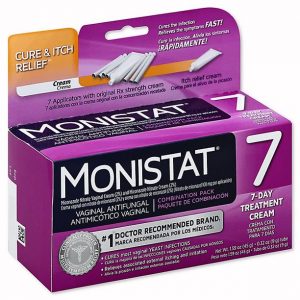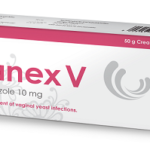How Do You Know If Monistat 7 Is Working?

Monistat 7 is a low-dose (2%) miconazole nitrate cream used for the treatment of yeast infection. It comes with a tube of cream and 7 empty applicators that you fill yourself before using. A vaginal yeast infection, also known as candidiasis, is a common condition. A healthy vagina contains bacteria and some yeast cells. But when the balance of bacteria and yeast changes, the yeast cells can multiply. This causes itching, swelling, and irritation. Treating a vaginal yeast infection can relieve symptoms within a few days. In more severe cases, it may take longer.
The CDC recommends only a 7-day topical yeast infection treatment for pregnant women and diabetics.
Miconazole reduces vaginal burning, itching, and discharge that may occur with this condition. This medication is an azole antifungal. It works by stopping the growth of yeast (fungus) that causes the infection.
How to use Monistat 7 Cream With Applicator
If you are using the over-the-counter product to self-treat, read all directions on the product package before using this medication. If you have any questions, consult your pharmacist. If your doctor has prescribed this medication, use it as directed.
Read the Patient Information Leaflet available from your pharmacist. Consult your doctor or pharmacist if you have any questions.
This product is for vaginal use only. Wash your hands before and after use. Avoid contact with your eyes. If it gets into your eyes, wash them right away with plenty of water. Call your doctor if eye irritation persists.
Dosage is based on your medical condition and response to treatment. Use the medication usually once daily at bedtime for 1 to 7 nights depending on the product used, or as directed by your doctor. If you are using the single dose tablet, it may be used during the daytime or at bedtime.
How long does Monistat 7 take to work?
When used as directed, Monistat 7 starts working immediately, you may start to get relief of symptoms in a few hours. If your symptoms do not get better in 3 days or symptoms last more than 7 days, these may be signs that you may have a more serious condition.

How Do You Know If Monistat 7 Is Working?
When Monistat 7 starts working, you will notice the following signs:
- Your vaginal itching will begin to abate
- You will see signs of reduced swelling around the vaginal area
- The burning sensation during urination or sex will stop
- The pain you experience during sex will reduce or stop
- The general soreness that characterizes yeast infection will start to disappear
- Yeast infection induced redness will also begin to disappear
- You will experience relief from the rash.
The most visible sign that Monistat 7 has started working is the gradual reduction in the whitish-yellow and clumpy vaginal discharge which some people describe as looking like cottage cheese. Sometimes the discharge may also be watery.
Most people will feel relief within the first 24 hours after using Monistat 7. You should definitely feel some improvement within the first 3 days after starting Monistat 7 and completely better within 7 days. If you don’t feel any improvement within 3 days or you are still having symptoms over a week later, please contact your healthcare provider.
What side effects may I notice from receiving Monistat 7?
Side effects that you should report to your doctor or health care professional as soon as possible:
• allergic reactions like skin rash, itching or hives, swelling of the face, lips, or tongue
• stomach pain
• vaginal pain or swelling
Side effects that usually do not require medical attention (report to your doctor or health care professional if they continue or are bothersome):
• headache
• vaginal irritation, itching or burning
This list may not describe all possible side effects. Call your doctor for medical advice about side effects. You may report side effects to FDA at 1-800-FDA-1088.
Are there any other precautions or warnings for this medication?
Before you begin using Monistat 7, be sure to inform your doctor of any medical conditions or allergies you may have, any medications you are taking, whether you are pregnant or breast-feeding, and any other significant facts about your health. These factors may affect how you should use this medication.
Birth control: Monistat 7 may reduce the effectiveness of latex condoms, diaphragms, and vaginal spermicides. The use of alternative forms of birth control while using this medication is recommended.
First-time users: If this is your first time experiencing a vaginal yeast infection, you should see your doctor before using Monistat 7 so that your condition can be properly diagnosed.
For external use only: Monistat 7 vaginal is for vaginal and external use only. Do not take these medications by mouth.
Other medical conditions: If you have a fever, abdominal pain, or foul-smelling vaginal discharge, your symptoms may be due to a more serious condition other than a yeast infection. Talk to your doctor immediately and do not use Monistat 7.
Repeat infections: If you have frequent vaginal yeast infections or if your yeast infection returns in less than 2 months, see your doctor before using this Monistat 7 again.
Pregnancy: Monistat 7 should not be used during pregnancy unless recommended by your doctor. If your doctor recommends this medication, be careful using the vaginal applicator or insert the ovule with your finger.
Breast-feeding: It is not known if Monistat 7 passes into breast milk. If you are a breastfeeding mother, do not use Monistat 7 unless recommended by your doctor.
Children: Monistat 7 should not be used by girls less than 12 years of age unless recommended by a doctor.





